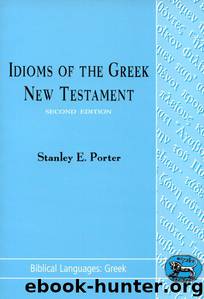Idioms of the Greek New Testament by Stanley E. Porter

Author:Stanley E. Porter [Porter, Stanley E.]
Language: eng
Format: epub
Tags: Language Study, Biblical Studies, Biblical Reference, Religion, New Testament Greek, New Testamenr Grammar, New Testament
ISBN: 9781850753797
Google: W2ZKXHNKqM0C
Amazon: 1850753792
Barnesnoble: 1850753792
Publisher: A&C Black
Published: 1992-06-30T22:00:00+00:00
1. Substantive
As noted above, a participle may serve in a variety of contexts in the same way as other substantives, including especially nouns. This is called attributive usage in many grammars. The advantage that the participle has over these other forms is that it grammaticalizes verbal aspect, along with voice. In other words, the participle adds the semantic features of its respective verb tense-form, which must be considered in appreciating the full force of the phrase or clause. One of the distinguishing characteristics of the substantival use of the participle is the frequent syntactical accompaniment of the article (absence of the article does not guarantee that it is not substantival, however).
Lk. 10.37: ὁ ποιήσας τὸ ἔλεος (the one who practiced mercy).
Rom. 2.1: τὰ γὰρ αὐτὰ πράσσεις ὁ κρίνων (for you who judge [i.e. the one judging] do the same things).
Phil. 3.17: σκοπεῖτε τοὺς οὕτω περιπατοῦντας (watch out for those who walk [i.e. conduct themselves] in this way).
Acts 1.19: πᾶσι τοῖς κατοικοῦσιν Ἰερουσαλήμ (to all inhabiting Jerusalem).
Lk. 3.14: ἐπηρώτων…αὐτὸν καὶ στρατευόμενοι…(those serving as soldiers asked him…), a substantival usage without the article.
Download
This site does not store any files on its server. We only index and link to content provided by other sites. Please contact the content providers to delete copyright contents if any and email us, we'll remove relevant links or contents immediately.
The Five People You Meet in Heaven by Mitch Albom(3545)
The Secret Power of Speaking God's Word by Joyce Meyer(3142)
Real Sex by Lauren F. Winner(3000)
Name Book, The: Over 10,000 Names--Their Meanings, Origins, and Spiritual Significance by Astoria Dorothy(2962)
The Holy Spirit by Billy Graham(2932)
0041152001443424520 .pdf by Unknown(2833)
How The Mind Works by Steven Pinker(2801)
ESV Study Bible by Crossway(2768)
Ancient Worlds by Michael Scott(2661)
Churchill by Paul Johnson(2564)
The Meaning of the Library by unknow(2552)
The ESV Study Bible by Crossway Bibles(2543)
The Gnostic Gospels by Pagels Elaine(2515)
MOSES THE EGYPTIAN by Jan Assmann(2406)
Jesus by Paul Johnson(2347)
City of Stairs by Robert Jackson Bennett(2335)
The Complete Dead Sea Scrolls in English (7th Edition) (Penguin Classics) by Geza Vermes(2268)
The Nativity by Geza Vermes(2217)
Ancient Near Eastern Thought and the Old Testament by John H. Walton(2213)
